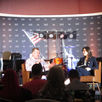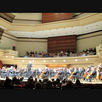Ice and Fire in the New-to-Chicago Production of “Turandot” at Lyric Opera
- Dec 21, 2017
- 5 min read

How many times do we consciously challenge our spirit and even existence in order to pursue some enigmatic idea or win some unapproachable person? We risk our lives to get that star in the sky, although it shines at us coldly and with indifference. The colder is the star, the hotter is our desire. It burns everything in its way, and often times this desire is called love. “Turandot,” the last operatic work by famous Italian composer Giacomo Puccini, addresses these complicated issues. Lyric Opera of Chicago took the responsibility to analyze the deep meaning of this heated fairy tale and is happy to present its new-to-Chicago production of “Turandot” that runs December 5 to January 27.
The opera itself is a mixture of questions and mysteries. The original inspiration is a Persian story that is set in ancient China, but it is sung in Italian. The synopsis includes scenes of death and torture, but it also has three characters named Ping, Pang, and Pong that add elements of comedy to it. Princess Turandot is beautiful, but she is unhappy because she carries in her heart the pain of a female ancestor who was raped centuries ago. She says that she will marry any man who solves her three riddles, but then refuses to marry an unknown prince who solves them. This prince, whose name is Calaf, watches her behead a rival suitor but still instantly falls in love with her.
He offers Turandot a riddle of his own, and if she answers correctly, he will agree to a death sentence. If she doesn’t learn his name, everyone in the city will be killed. Turandot's servants torture Liù, who is the slave of Calaf’s father and who loves Calaf. She protects her old master by saying that only she knows the stranger’s name. Later on she kills herself, but her death seems meaningless when Turandot suddenly falls in love with Calaf and agrees to marry him. All these tragic, lyrical and triumphal moments are reflected in the exotic orchestration, magnificent melodies and extremely rich choral sections of this brilliant opera. “Nessun dorma,” the highlight aria of the opera, is considered to be the most popular of all Italian tenor arias.
Puccini left this opera unfinished when he died in 1924, and it was later completed by Franco Alfano in 1926. The same year the premier of “Turandot” was presented at the Teatro alla Scala in Milan. Lyric Opera of Chicago first performed it in 1958, and now this great cultural institution is delighted to welcome “Turandot” back to its stage.
“From those early years to today, Lyric has gone the extra mile to bring authenticity of style and powerful theatricality to the Puccini operas, and ‘Turandot’ is no exception,” said General Director, President and CEO of Lyric Opera of Chicago Anthony Freud. “This company has always recognized the unique appeal of Puccini’s last opera, with its astounding atmosphere and brilliantly colorful orchestration, its massively scaled choral episodes (quite atypical for Puccini, whom we don’t normally associate with choral music), and above all, the opportunities he gave the principal artists.”
Lyric Opera is proud to have the best cast for this new-to-Chicago production. Stefano La Colla, the celebrated Italian tenor who has triumphed previously as Puccini’s Calaf in major European theaters, is happy to make his Lyric and U.S. debut. His Calaf captures the audience’s attention with the distinctively brilliant and ringing quality in the timbre of his voice, which still remains powerful and solid. Being one of the most valued tenors of his generation, La Colla finds the best way to present this dramatic character using all the lyricism and charisma of his vocal talent. Calaf’s “Nessun dorma” aria in his presentation makes the audience tremble, while his charismatic appearance makes this character unforgettable.
Lyric Opera’s “Turandot” also features the acclaimed American soprano Amber Wagner, who is a Ryan Opera Center alumna. Acknowledged to have one of the most remarkable voices of her generation, Wagner had a successful debut in the role of Turandot earlier this season at Vancouver Opera. Now, she is shining on the stage at Lyric Opera demonstrating to its audiences all the beauty, warmth and dramatism of her talent. The audience is thrilled to hear her clear and rich timbre full of bright colors that help Wagner enhance the beautiful solos of Turandot.
Lyric Opera welcomes two acclaimed soprano singers for the role of Liù. In December, talented Italian singer Maria Agresta brilliantly portrays this character, and in January distinctive Chicago native singer Janai Brugger will present this touching role. For Agresta, it is a Lyric debut, and she is delighted to be on this famous stage. Her exceptional vocal skills brought her great reviews from public and critics from all over the globe and opened the doors of many prestigious opera houses. The Chicago audience has welcomed Agresta with great interest and has appreciated her passionate and lyric approach to presenting Liù. Although Janai Brugger is a Chicago native, it will be her debut at Lyric Opera, and she is looking forward to it with delight. Being an experienced singer with a great history of performing on many American and European operatic stages, Brugger is happy to perform in her hometown.
The Italian bass Andrea Silvestrelli, who portrays the role of Calaf’s father, Timur, is already known to Lyric Opera audiences. Since 2000/2001 season, he has brilliantly presented twelve roles, most recently the role of Nourabad in “The Pearl Fishers.” In “Turandot,” Silvestrelli finds the best way to portray the dramatically enhanced role of Timur, the king of Tartary, who was deposed by Chinese rulers and had to run away from his own land. His exceptional artistic and vocal skills impress the audience and add to the production additional dramatism and lyricism.
Turandot’s three ministers, Ping, Pang and Pong, bring to the opera a spin on classic Commedia dell’arte style. They are brilliantly performed by famous American baritone Zachary Nelson (Ping), charismatic Filipino-American tenor Rodell Rosel (Pang), and talented American tenor Keith Jameson (Pong). The role of Emperor Altoum, Turandot’s father, became a Lyric debut for bright Canadian tenor Josh Lovell, who made his Canadian operatic debut in 2013 with Pacific Opera Victoria. His appearance on the stage at Lyric Opera is a great addition to the “Turandot” cast. Patrick Guetti, the third-year Ryan Opera Center bass, plays the important role of a Mandarin in this opera. His powerful voice with rich and deep colors impresses the audience with its first sounds and highlights the importance of this character.
It is important to note the incredible work of the expanded eighty-four-member Lyric Opera Chorus, which is prepared by Michael Black, Lyric’s acclaimed chorus master. This opera wouldn’t be the same without its rich and sweeping chorus sections that add brilliance to this enchanting operatic work. Certainly, the collaboration between the members of the Lyric Opera Chorus and the Lyric Opera Orchestra directed by Sir Andrew Davis plays a great role, and it is performed in a vivid and outstanding manner.
Each part of this great opera is touching, intensely moving and thought through. Puccini combined classical melodic lines and lines based on traditional Chinese melodies, which are fantastically presented by the orchestra. This new-to-Chicago production, directed by Rob Kearley with lighting by Chris Maravich and August Tye serving as movement director, is another gem in the Lyric Opera collection. The presence of Chicago Children’s Choir makes this production even more touching, adding sensitivity and warmth.
“Love is in vain if Luck isn’t there,” these are the words from the libretto to Puccini’s “Turandot.” Whether the main characters of this unfinished heroic masterpiece caught their luck or not is a question for the audience. In either case, it is certain that from the opening chords representing an executioner’s axe up to Turandot’s triumphal words “His name is Love,” this opera remains Puccini’s most musically adventurous and genius work.
For more information and to purchase tickets, please go to www.lyricopera.org or call 312-827-5600.
Natalia Dagenhart
Photo: Courtesy of Andrew Cioffi

























Comments